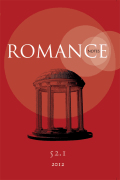
ROMANCE NOTES
Scope & Guideline
Bridging Language, Culture, and Literary Insight
Introduction
Aims and Scopes
- Cultural and Literary Analysis:
The journal emphasizes critical examinations of literature and cultural artifacts, particularly those rooted in Romance languages, focusing on themes of identity, representation, and societal critique. - Interdisciplinary Approaches:
It encourages interdisciplinary research that intersects literature with other fields such as visual culture, musicology, and political science, fostering a broader understanding of cultural phenomena. - Gender and Identity Studies:
A core area of focus involves gender studies, exploring issues of femininity, masculinity, and queer identities within the context of literary and cultural narratives. - Postcolonial and Transnational Perspectives:
The journal highlights postcolonial critiques and transnational dialogues, examining how colonial histories and migrations shape contemporary cultural expressions and identities. - Pedagogical Implications:
It also addresses the pedagogical aspects of literature and culture, discussing how these can be effectively integrated into educational frameworks and curricula.
Trending and Emerging
- Digital Humanities and Visual Culture:
There is a growing interest in the intersection of digital humanities and visual culture, as seen in the exploration of contemporary Spanish visual culture and its pedagogical implications. - Flamenco and Modern Identity:
The examination of flamenco as a cultural phenomenon, particularly through the lens of artists like Rosalía, showcases an emerging trend of analyzing traditional art forms in relation to modern identities and global commodification. - Racial and Ethnic Stereotypes:
An increasing focus on racial and ethnic stereotypes in literature reflects a broader societal conversation about representation, identity, and power dynamics, indicating a commitment to social justice themes. - Environmental and Ecological Narratives:
Emerging discussions on ecological narratives and environmental justice indicate a trend towards understanding literature as a means to engage with pressing global issues. - Transnational and Diasporic Studies:
The journal is increasingly publishing works that investigate transnational identities and diasporic experiences, highlighting the complexities of migration and cultural exchange.
Declining or Waning
- Traditional Literary Canon:
There seems to be a decreasing emphasis on traditional literary canon studies, with fewer papers focusing solely on canonical texts without intersection with contemporary social issues or other disciplines. - Historical Literary Criticism:
Research that strictly adheres to historical literary criticism, without incorporating modern theoretical frameworks or contemporary relevance, is less frequently published. - Monolithic Cultural Narratives:
The exploration of singular, monolithic cultural narratives is declining, as the journal increasingly favors multifaceted and intersectional analyses that reflect diverse voices and experiences.
Similar Journals

Kamchatka-Revista de Analisis Cultural
Fostering critical insights across diverse fields.Kamchatka-Revista de Analisis Cultural is a distinguished open-access journal published by the University of Valencia, Department of Prehistory and Archaeology, situated in the vibrant cultural landscape of Valencia, Spain. Since its establishment in 2013, this journal has dedicated itself to advancing knowledge across an array of interdisciplinary fields, including Communication, Cultural Studies, History, Linguistics and Language, and Literature and Literary Theory. With an impressive categorization in the latest 2023 category quartiles, Kamchatka has positioned itself in Q1 for Literature and Literary Theory and consistently ranks within Q2 for several relevant disciplines. This exemplary standing is further validated by its Scopus ranking, reflecting the journal's capacity to engage and disseminate high-quality scholarly discourse. By providing a platform for innovative research and critical analysis, the journal not only enriches academic conversations but also advocates for the dissemination of cultural insights and narratives essential for both researchers and students alike. Engage with Kamchatka-Revista de Analisis Cultural and contribute to the ever-evolving dialogue in the humanities.
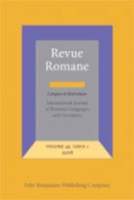
REVUE ROMANE
Fostering Critical Conversations in Language and LiteratureREVUE ROMANE is a prestigious academic journal published by John Benjamins Publishing Co, located in the Netherlands. With a rich heritage dating from 1996 to 2024, this esteemed journal focuses on the dynamic interplay of *Linguistics* and *Literature*, making it an essential resource for scholars, researchers, and students alike. By showcasing a range of theoretical and empirical studies, the journal has positioned itself in the Q3 and Q2 quartiles for *Linguistics and Language* and *Literature and Literary Theory* respectively, reflecting its significant impact on these fields. With impressive Scopus rankings, including a notable 79th percentile in Arts and Humanities within Literature and Literary Theory, REVUE ROMANE serves as a critical platform for the exploration of both language and literary expressions, encouraging dialogues that bridge cultural and linguistic divides. Although it is not open access, its contributions are invaluable for advancing knowledge and fostering scholarly discourse in the realms of linguistic and literary investigation.
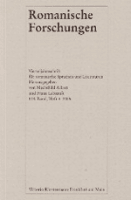
ROMANISCHE FORSCHUNGEN
Unveiling the Nuances of Romance LanguagesROMANISCHE FORSCHUNGEN, published by VITTORIO KLOSTERMANN GMBH, stands as a key scholarly journal in the fields of linguistics and literary studies, focusing particularly on Romance languages and literature. With an ISSN of 0035-8126 and an E-ISSN of 1864-0737, this journal is vital for researchers and scholars seeking to explore and advance their understanding of the nuances within Romance language studies. Operating from its base in Frankfurt am Main, Germany, ROMANISCHE FORSCHUNGEN features a robust publication history from 2002 to 2024. While currently categorized in Q4 within both Linguistics and Language and Literature and Literary Theory for 2023, the journal aims to cultivate a scholarly dialogue that bridges these disciplines, fostering an environment for innovative and critical inquiry. Although not an open-access journal, it serves as a crucial resource for professionals and students dedicated to Romance philology and comparative literature.

Literature and Aesthetics
Connecting Literary Theory with Artistic InnovationLiterature and Aesthetics, published by the Sydney Society for Literature and Aesthetics, is a distinguished journal that explores the interplay between literary and aesthetic theory, offering a platform for scholarly discourse on a diverse range of topics related to literature, art, and culture. With a focus on both contemporary and historical perspectives, the journal aims to deepen our understanding of aesthetic experiences and their relation to various literary forms. Although currently not an Open Access publication, it remains pivotal for researchers, professionals, and students keen on critical analyses and innovative thought in literature studies. Based in Australia, the journal serves as a vital resource, encouraging submissions from international scholars and contributing significantly to the global dialogue on aesthetics and literary theory.

Chung Wai Literary Quarterly
Illuminating the Rich Tapestry of Chinese LiteratureChung Wai Literary Quarterly is a distinguished academic journal published by NATL TAIWAN UNIV PRESS, dedicated to advancing the study of literature and cultural discourse in the Chinese-speaking world. With its ISSN 0303-0849, this quarterly publication serves as a vital platform for scholars, students, and literary enthusiasts interested in exploring contemporary and classical literary themes through a critical lens. Although it does not currently offer open access options, the journal is well-regarded for its rigorous selection process and commitment to scholarly excellence. The editorial team curates a diverse range of articles that encompass literary critique, theoretical explorations, and interdisciplinary dialogues, contributing significantly to the academic conversation in this field. As it continues to bridge the gap between scholarly inquiry and practical engagement with literature, Chung Wai Literary Quarterly remains an essential resource for anyone seeking to deepen their understanding of literary studies and its broader implications.

Romanic Review
Exploring the Depths of Romance Languages and LiteratureThe Romanic Review, published by Duke University Press, stands as a significant scholarly platform in the field of Romance languages and literature. With its ISSN 0035-8118 and E-ISSN 2688-5220, this journal has been serving the academic community since its inception and will continue its contribution until 2024. Situated in the United States, it has carved out a vital niche in the Arts and Humanities, currently falling within the Q3 quartile as per the 2023 rankings. Although it operates under a traditional subscription model, its focus on disseminating critical and innovative research makes it an indispensable resource for scholars and students alike. The Romanic Review is dedicated to fostering academic discussions that bridge interdisciplinary gaps, making it a cornerstone reference for anyone engaged in the study of Romance cultures, linguistics, and literary studies.
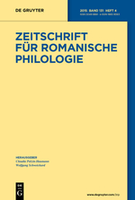
ZEITSCHRIFT FUR ROMANISCHE PHILOLOGIE
Cultivating Knowledge in the Humanities Through Rigorous ResearchZEITSCHRIFT FUR ROMANISCHE PHILOLOGIE, published by Walter de Gruyter GmbH, stands as a prominent peer-reviewed journal dedicated to the fields of Linguistics, Literature, and Literary Theory. Established in 1877 and continuing its legacy to the present day, this esteemed journal offers a platform for comprehensive scholarship that explores the intricacies of Romance languages and their literary heritage. With a notable Q1 ranking in Literature and Literary Theory and a Q2 ranking in Linguistics and Language, it has secured its place among leading resources in the humanities. Researchers, educators, and students benefit from its rich historical context and current contributions to the understanding of Romance languages and literature. Though currently not available as Open Access, the journal prioritizes the dissemination of high-quality research, making significant strides in fostering academic dialogue and advancement. Its address at Genthiner Straße 13, Berlin, Germany, situates it in a hub of scholarly activity, bridging the past with contemporary literary discourse.
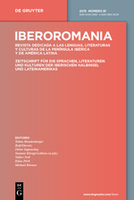
IBEROROMANIA
Advancing Scholarship in Romance Languages and Literary TheoryIBEROROMANIA, published by WALTER DE GRUYTER GMBH, stands as a pivotal journal in the fields of Linguistics and Language and Literature and Literary Theory. Since its inception in 1969, IBEROROMANIA has facilitated scholarly discourse by providing a platform for cutting-edge research that explores the complexities of Romance languages and their literatures. The journal is recognized for its valuable contributions, currently holding a Q3 quartile ranking in Linguistics and Language and a Q2 ranking in Literature and Literary Theory as of 2023. With its diverse scope spanning several years, including works from 1970 to 2024, IBEROROMANIA is pivotal for researchers, professionals, and students alike, fostering a deeper understanding of Romantic linguistic and literary frameworks. Although it does not provide open access, its impact in the Arts and Humanities is underscored by its Scopus rankings, reflecting a commitment to high-quality scholarship. For those dedicated to exploring the nuances of Romance languages and literature, IBEROROMANIA is an indispensable resource.

REVUE DES LANGUES ROMANES
Exploring the Depths of Romance LanguagesREVUE DES LANGUES ROMANES is an esteemed academic journal published in France, dedicated to the study of Romance languages, linguistics, and literary theory. With an ISSN of 0223-3711, this journal has transitioned to an Open Access model since 2022, broadening accessibility and encouraging collaborative research across disciplines. It serves as a platform for researchers, professionals, and students to explore the intricacies of language and literature within the broader context of arts and humanities. Notably, REVUE DES LANGUES ROMANES has achieved Q4 quartile rankings in 2023 for its contributions to Archaeology, Linguistics, and Literature, reflecting its commitment to fostering scholarly dialogue, despite its emerging status in the academic landscape. With a focus on interdisciplinary approaches, the journal invites innovative insights and critical analyses that further understanding in these fields, promoting the depth and richness of Romance languages and their cultural implications.

Cartaphilus
Exploring Multidisciplinary PerspectivesCartaphilus is a distinguished academic journal published by UNIV MURCIA, focusing on a multidisciplinary approach to the humanities and social sciences. Based in Spain, the journal aims to foster dialogue and collaboration among researchers, practitioners, and students in these fields. Although specific metrics like the impact factor and H-index are currently not available, Cartaphilus strives to be a vital resource for original research, innovative ideas, and critical discourse, contributing to the advancement of knowledge in the humanities. The journal is particularly valuable for scholars seeking an open platform for their work, as it emphasizes accessibility and inclusivity in scholarly communication. By bridging various disciplines and perspectives, Cartaphilus plays a crucial role in the academic landscape, encouraging new insights and enriching the scholarly community.